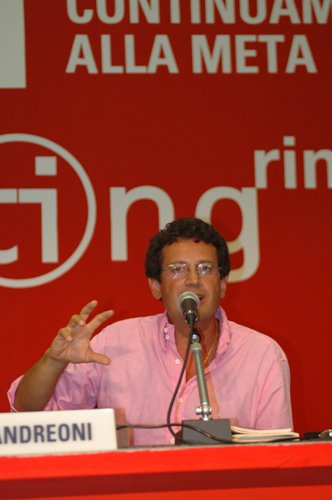SPIRTO GENTIL. GUIDE ALL’ASCOLTO
The Fourth Symphony of Brahms. Listening guide with CD by Maestro Roberto Andreoni.
Spirto Gentil is a new proposal for listening to music, not only because it sets out to empha¬size a repertoire that today is either completely forgotten or appreciated only by a few experts, but especially because of the series’ purpose. It is not yet another aesthetic or stylistic analysis, but rather a rediscovery of the foundation of every aesthetic attempt. Therefore, the series is positioned within that great Christian tradition that, over the course of 20 centuries and thanks to its constant ecumenical vocation, has been able to appreciate the most sincere expressions of the human experience, regardless of their culture of origin. It is not mistaken, then, in seeking to understand the original spirit of this series, to return to the extraordinary activity of the medieval copyists or to that of more recent personalities like Charles Moeller. Their work is born from an ancient certainty: Unum loquuntur omnia (all of reality proclaims one thing).
“In music, in the panorama of nature, in dreams at night (as Leopardi himself wrote in his Canto Notturno…), it is to something else that man pays homage, from which he expects something: he awaits it. His enthusiasm is for something that music, or everything that is beautiful in this world, has awakened within him. When a person begins to feel this, his soul immediately harks to await the other thing: even in the presence of what he can grasp, he awaits another thing; he grasps what he can grasp, but he awaits another thing.”
(Luigi Giussani)
The first to be “intimidated” by the magnificence of the symphony was Brahms himself, who, in a letter to a friend in 1885, expressed this judgment about his work: “I ask myself if it will be capable of garnering an audience. I am afraid that it tastes like the climate here. The cherries don’t ripen in these parts; you wouldn’t eat them.”
This symphony is like the thrust of reason that stretches toward reality, that opens wide in admiration at the entire world in its richness of organic particulars. This suggestion of a cosmic breadth, this echo and this reverberation of the whole, however, already contains in certain points the perception of something more. Brahms is forced, as it were, to admit the existence of something other that imposes itself on our attention. Even if one refuses this as a structural dimension of the person and attempts to reduce his boundless need for meaning to what he himself can measure, if he is attentive and serious, he cannot avoid feeling the blow of reality: everything affirms a beyond. A man who is serious, serious with himself and with life, cannot help but perceive, feel, and therefore admit that there is something beyond what he sees and hears.
(Luigi Giussani)




